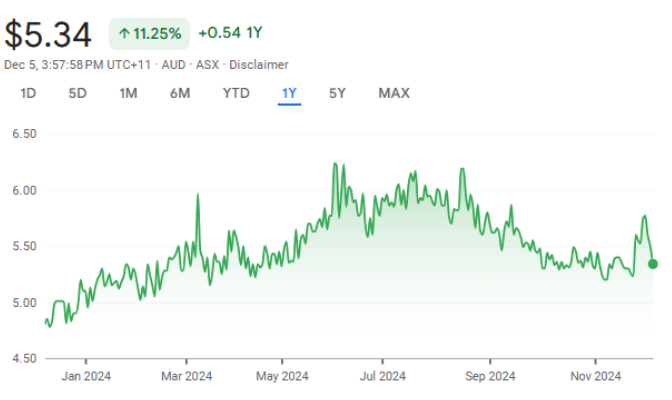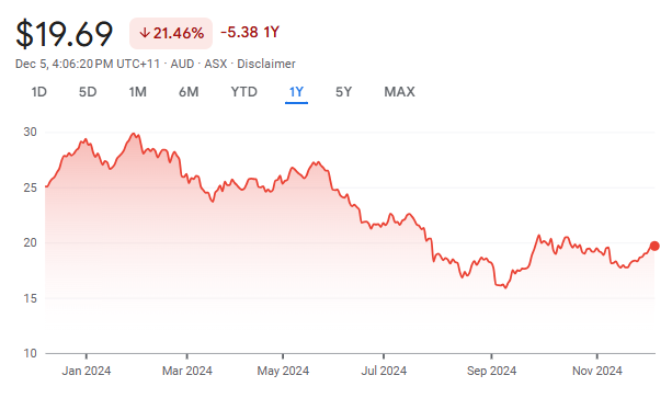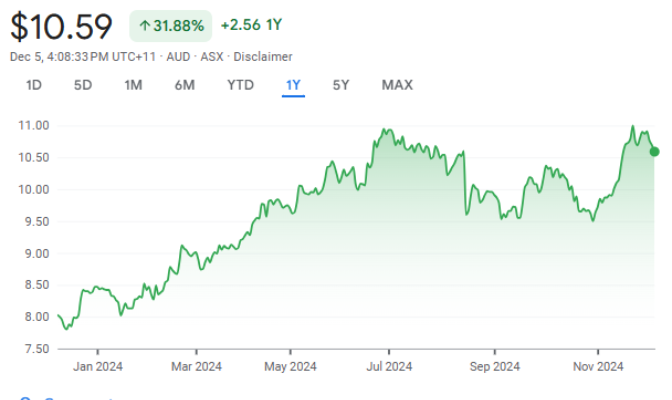What Are ASX Renewable Energy Shares?
ASX renewable energy shares cover companies on the Australian Securities Exchange involved in renewable energy production, technology, and supply chain management.
This sector includes a range of businesses from those transitioning from fossil fuels to renewables like Origin Energy, to fully renewable enterprises like Meridan Energy, which generates 100% of its power from green sources.
Why Invest In Renewable Energy Companies In Australia?
In the landscape of the Australian Securities Exchange (ASX), top renewable energy stocks are garnering attention as investors increasingly prioritize sustainability and the global transition towards greener energy sources. Among these, companies possessing green energy assets, such as hydropower stations, geothermal plants, and wind farms, stand out for their contribution to Australia's total electricity generation and their role in reducing carbon emissions.
Investment in Australian renewable energy companies is not only environmentally sound but also increasingly lucrative. The Australian government's target for renewable energy to account for 82% of power generation by 2030 up from 29% in 2021, showcases the sector's robust growth trajectory.
Investing in renewable energy stocks, such as through exchange traded funds (ETFs) that focus on the sector, also allows investors to support the climate change mitigation effort while potentially benefiting from the sector's growth. Companies with its extensive exploration assets and development projects, demonstrates how the private sector is crucial in advancing the global transition to a sustainable energy future.
The success of renewable sources in regions like New South Wales and the broader Australian and New Zealand markets, evidenced by home solar panels, commercial solar arrays, and renewable energy equipment, indicates a strong movement towards reducing reliance on fossil fuels.
This shift towards green energy, coupled with the rising trend in ESG investing, positions the renewable sector as a potentially high-return investment avenue. The BetaShares Global Sustainability Leaders ETF (ASX: ETHI) is one such example, offering investors a way to participate in this growing market.
Get the Latest Stock Market Insights for Free with
Stocks Down Under & Pitt Street Research
Join our newsletter and receive exclusive insights, market trends, investment tips, and updates delivered directly to your inbox. Don't miss out – subscribe today!
Future Outlook Of The ASX Renewable Energy Sector
The outlook for the ASX renewable energy sector is optimistic, with renewable energy sources expected to significantly increase their contribution to Australia's energy consumption. The commitment to boost renewable energy's share to 82% by 2030 represents a substantial increase and underscores the potential for expansion and investment within this industry.
This being said, there will be a large amount of capital expenditure required to realise this, at least some of which will have to be publicly funded (i.e. from the government), but a fair proportion will have to come from the companies and be externally funded (i.e. from debt or dilutive equity finance). It goes without saying that larger, more established players, have rosier outlook than smaller caps because they will be able to self-fund a substantial proportion of their ambitions.
Best ASX Renewable Energy Stocks ASX To Buy Now

Meridian Energy Ltd (ASX:MEZ)
Meridian Energy stands as a premier investment in the renewable energy sector, boasting a unique position with its 100% renewable energy generation portfolio, including hydropower, wind, and solar installations. Its flagship asset is New Zealand's largest hydro station, the 122 MW Manapouri project in the Southland district, underscores its significant capacity and commitment to sustainable energy.

Fortescue Metals (ASX:FMG)
Fortescue Metals (ASX: FMG) is an iron ore producer and exporter but has made forays into hydrogen energy. It has a specific division Fortescue Future Industries (FFI) to look at hydrogen opportunities. And in April 2024, it opened an electrolyser manufacturing facility in Queensland. It will be the first of its kind in Australia to do this on a commercial scale.

Origin Energy (ASX:ORG)
Origin Energy (ASX:ORG) is a retail energy provider that is looking to get into hydrogen. Origin has proposed building a Hydrogen Hub in the Hunter Valley. For this, it received $45m from the NSW government in September 2023 and signed a joint development agreement with Orica. First production is targeted from 2026.
The Best Renewable Energy Stocks ASX To Buy Now
Things To Consider Before Investing In Renewable Energy Stocks
Investors should note the sector's P/S ratio has increased from an average of 2.5x over the past three years to 8x as of March 2024, reflecting heightened investor optimism.
The stock price and past performance of companies within this space can also offer insights into the sector's growth potential. However, it is the underlying assets, such as hydro stations, wind farms, and geothermal plants, and the purchase agreements for green energy that truly underline the value and sustainability of these investments.
However, the industry's total earnings have declined, now making a loss overall. This volatility underscores the importance of thorough research into specific companies and their market position, technology, and financial health before investing.
Pros And Cons Of Investing In Australian Renewable Energy Shares
The renewable energy sector's potential for long-term growth is supported by government mandates and an increasing shift away from fossil fuels.
However, the industry's emerging status brings risks, including competition among technologies and the potential for some companies to fail. Despite these challenges, the push for sustainability and the sector's projected 17% annual earnings growth highlight its appeal to investors committed to environmental causes.
How To Choose The Right ASX Renewable Energy Stocks?
When selecting ASX renewable energy stocks, look for companies with a solid track record, strategic government partnerships, and innovative technologies.
Companies that have demonstrated clear progress in their renewable energy business, and established businesses (renewable or non-renewable), are more promising investments than those that have not.
How To Invest In ASX Renewable Energy Stocks?
Investing in renewable energy stocks can be approached through direct share purchases via online brokerages or through ETFs and mutual funds specializing in the sector.
ETFs like ETHI offer curated exposure to companies adhering to strict ESG criteria, providing a simpler entry point for investors. Rigorous analysis of the sector and individual stock performance remains essential for informed investment decisions.
Are Australian Renewable Energy Stocks A Good Investment?
Given the strong governmental and societal support for renewable energy projects and solar projects, Australian renewable energy stocks present a compelling investment opportunity for those aligned with sustainable and ethical investment principles.
While the sector's inherent risks due to its evolving nature cannot be ignored, the strategic investor can find valuable opportunities for both financial return and positive environmental impact, especially in light of the sector's significant expected growth and the broader global shift towards greener energy solutions.
FAQs on Investing in Renewable Energy Stocks
ASX renewable energy industry shares represent companies focusing on green, sustainable energy sources like wind farms, solar, and hydro, contrasting with traditional energy stocks that primarily involve fossil fuels, which have a higher environmental impact.
Our Analysis on ASX Renewable Energy Stocks
How to stop the ASX decline? ASIC and investors have some radical ideas
Addressing the ASX decline is a question that has been considered for many months now. In 2023-24, more companies left…
Warren Buffett is retiring, will hand the top job at Berkshire to Greg Abel by the end of 2025. Here’s what you need to know
After many decades at the helm of Berkshire Hathaway, Warren Buffett is retiring. After founding his empire in 1965, he…
ESG (Economic, Social and Governance) investing in 2025: Here’s an investor’s ultimate guide
ESG has become one of the most popular acronyms in the investing world, and a quickly growing trend. Few investors…
10 Best Solar Stocks to Buy in 2025
As the world shifts toward renewable energy, the solar industry has become a key driver of growth and innovation. Solar…
Here’s why the Huntly Power Station is being looked at…by Four ASX-listed energy companies
Its not every day you see four industry oligopolists publicly announcing they’re eyeing off a single commercial asset, let alone…
What Is ESG Investing? How to Align Your Portfolio with Your Values
If you own stocks and shares, you probably regularly wonder what impact these investments are making on your bank balance.…





